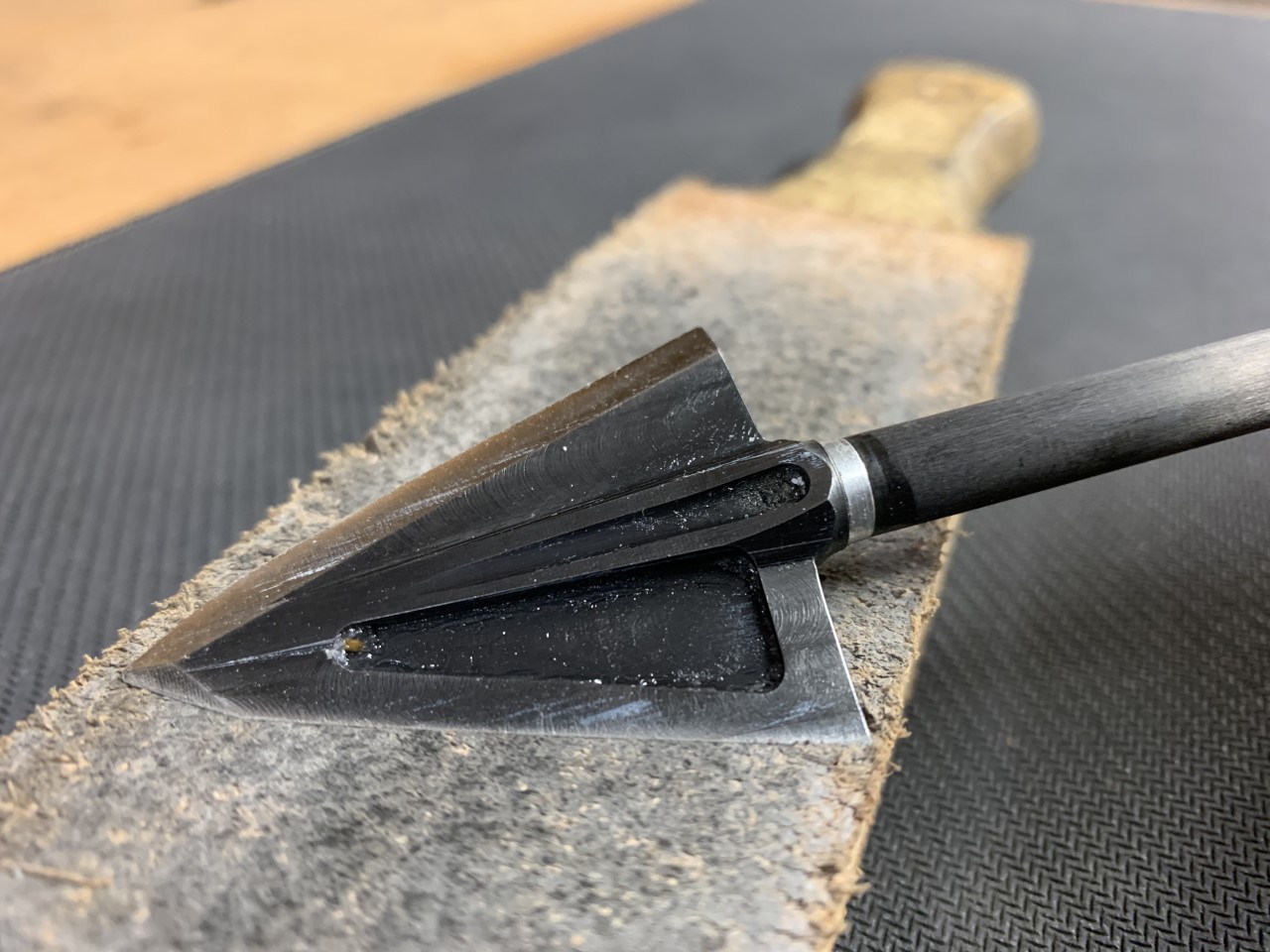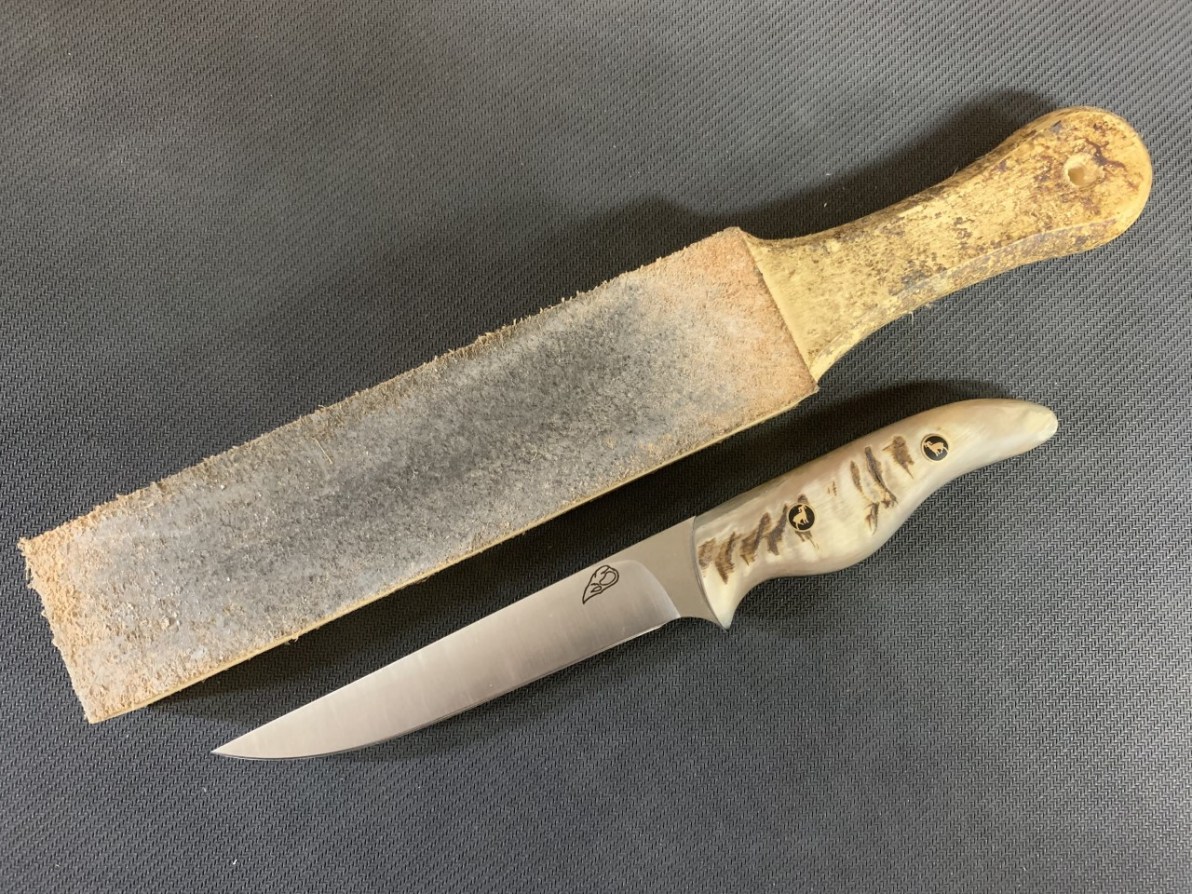We may earn revenue from the products available on this page and participate in affiliate programs. Learn More ›
Being able to put a sharp edge on a knife and keep it there is one of the most valuable skills for anyone that spends time in the outdoors. In the backcountry, there are few tools that can save your butt like a good knife, yet keeping your blade sharp is not something many hunters have mastered.
There are a tremendous amount of tools and sharpening aids available that make the process easy, but my go-to is a strop. If you’ve ever had a straight-razor shave (or seen one done in the movies) you know what I’m talking about. A barber will take his razor and sharpen the edge by stroking it back-and-forth on a long leather strap. You can do the same with your field knife and broadheads—it will keep their edge sharper longer.
Stropping is simple, and it can take the sharpness of your blades to a different level. The principle of stropping is to hone and polish an edge to both finish the sharpening process, and maintain a polished, fine edge so it makes cutting much easier. Essentially, stropping is just an ultra-fine abrasive that continues what you started on a diamond stone or whatever sharpening method you employ.
The edge of the knife is laid on the surface to match the grind angle, then pulled across, not pushed (to avoid catching). The strop pulls whatever micro-burring still exists out as you work the blade back-and-forth until you’re left with a sharp edge. You may think your new pocketknife is sharp right out of the box, but usually you can get them significantly sharper by stropping the rough factory edge. High-end knives can also benefit from a strop.
The the most common material for strops is leather, but there are better options than dragging a knife across your belt at the edge of a campfire. Leather is good because it’s durable, varies in its abrasiveness, and is great at taking on abrasive compounds. If you want to order a stropping setup, you can get pre-made strops (pieces of leather glued to a sort of wood paddle to provide you a firm and consistent grip).
You can choose a smooth or suede side, and even have a strip on both sides of the stropping paddle for different stages of the process. You can also easily make your own with a variety of leathers and a handle that suits your needs. You just want it to be easy to control. Although leather is probably the best, you can strop with many different materials. The abrasive materials embedded in cardboard that will kill your knife’s edge by cutting it, happen to make it an excellent stropping material.
Take Your Blade’s Edge To the Next Level

What can really take your edge to the next level is a stropping compound (or different strops with different grits of compound). Retailers, like DLT trading and other sharpening suppliers, offer a variety of compounds to give your strops very specific and effective abrasiveness. There are sticks that are similar to polishing compounds you’ll find at your local hardware store, as well as pastes and even sprays that contain properly-sized suspended diamond particles.
When you finish shaping an edge with your sharpening tool, stone, or belt, it will still be relatively rough, and just like sanding wood, the finer you step down the abrasiveness of your strop, the smoother the finish will be. You don’t want to mix grits on the same strop, so this is where having multiple sides or multiple strops comes in very handy. I use one with two sides. One side has a courser grit compound, and the other has a fine, finishing compound.
Read Next: First Look: Outdoor Life’s New Line of Camping Knives and Tools
Getting your stropping dialed in takes time and practice. But once you get it, you will likely find that you use your sharpening stones or tools much less. Once you have a good edge established, it can be much more easily maintained with only a strop, and I’ll rarely put a knife to a stone unless the edge needs reshaped, or it has been damaged.
In the field, I’ll use the Guided Field Sharpener by Worksharp, which has stones and ceramics for rebuilding an edge, but also has a small leather strop on one side to help finish it off. After field-dressing and quartering out an animal, I’ll usually just give a couple strokes on the ceramic and hit the strop. You can even keep disposable blades sharper—and get more life out of them—by using a strop.
Broadheads can also be stropped to enhance and maintain their edges, as well as just about anything else you want to keep hair-popping sharp. Your edges will last much longer when you maintain them with a strop instead of constantly grinding on them.
